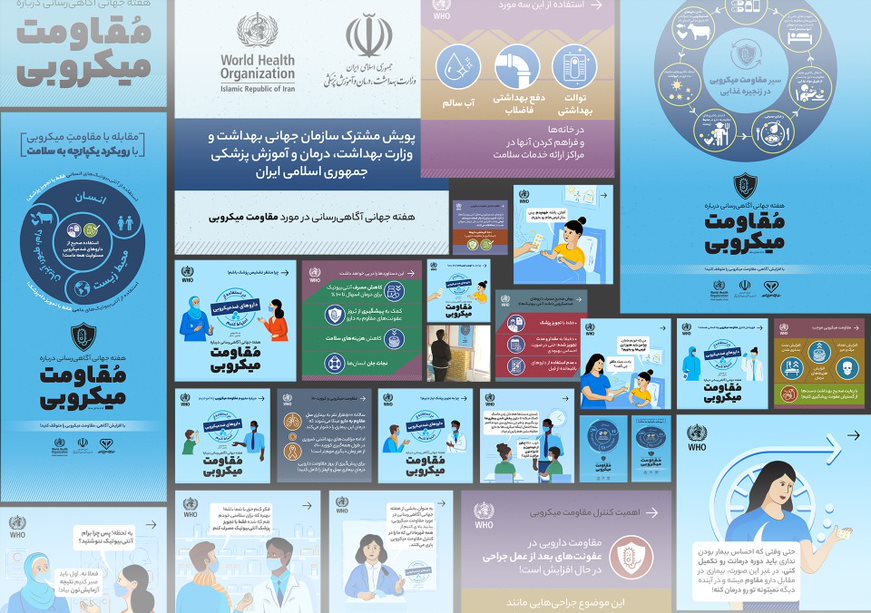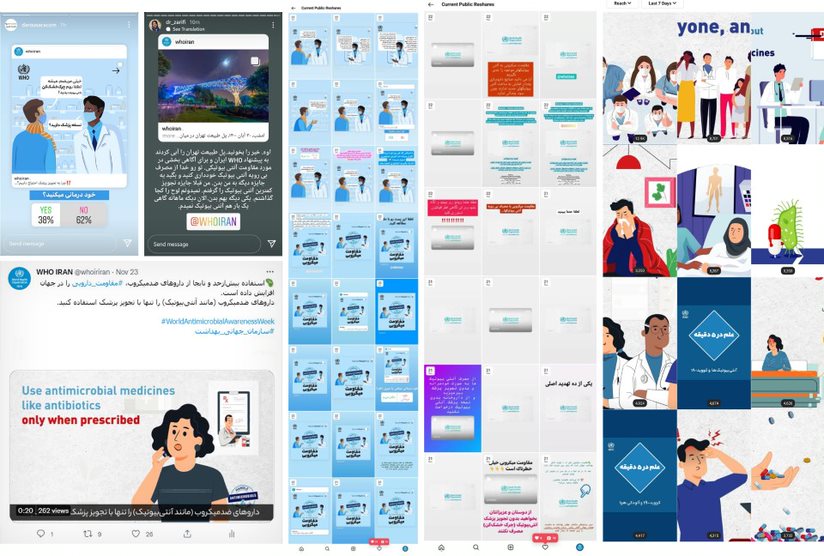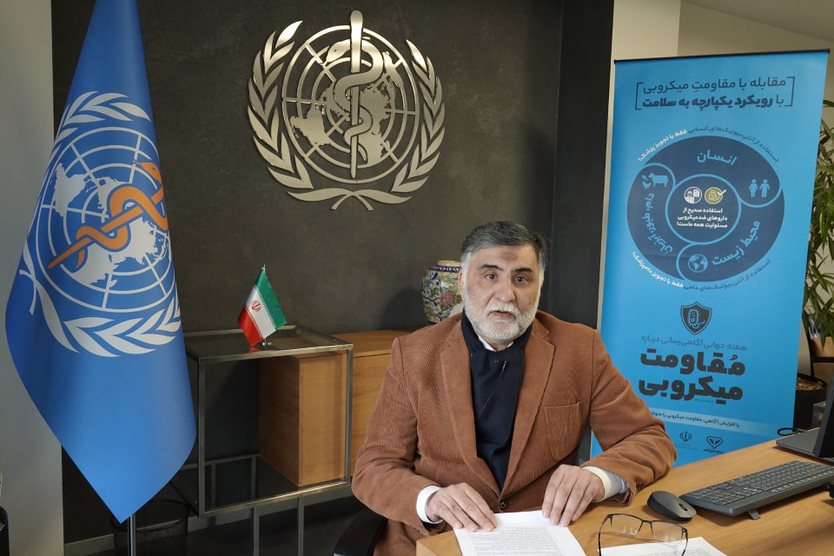Thursday, 25 November 2021 – World Antimicrobial Awareness Week 2021 was commemorated in the Islamic Republic of Iran in joint efforts by the World Health Organization (WHO) and Ministry of Health and Medical Education to highlight the importance of the proper use of antimicrobials, such as antibiotics, antivirals, antifungals and antiparasitics, and encourage individuals and all stakeholders in human, animal, and environmental health to be antimicrobial resistance awareness champions within their families, communities, and places of work. The Ministry engaged in global campaign activities to warn against the inappropriate and excessive use of antibiotics, increase knowledge about antimicrobial resistance and spread awareness about household, workplace, community and/or governmental actions that could affect its control or spread.
 Posters highlighting World Antimicrobial Awareness Week were displayed in health facilities
Posters highlighting World Antimicrobial Awareness Week were displayed in health facilities
Awareness-raising messages were translated into Farsi and 9000 banners and posters were developed jointly by WHO and the ministry highlighting the slogan ‘Spread awareness, stop resistance’ under the theme ‘Antimicrobials: Handle with care’. Campaign materials were distributed and displayed at hospitals and primary health care centres across the country. WHO and the Ministry also took to social media to share animations, short video messages subtitled and dubbed into Farsi and social media cards to engage with conversations with the public on antimicrobial resistance, how it has developed and spread and how to contribute to stopping it.
The posts shared on WHO's country office social media platforms Instagram, Twitter, and LinkedIn garnered over 25 000 likes and were reshared or reposted by the general public, physicians, pharmacists and social media influencers, hundred of times times in collective efforts to spread the messages of the campaign.
 The campaign gained traction on social media and campaign messages were shared hundreds of times in collective efforts to raise awareness
The campaign gained traction on social media and campaign messages were shared hundreds of times in collective efforts to raise awareness
WHO has declared antimicrobial resistance as one of the top 10 global public health threats currently facing humanity, and to highlight that important fact, in collaboration with the Communication and international Affairs Center, Municipality of Tehran, and the Abasabad Cultural Center member to the World Tourism Organization, the Tabiat (Nature) Bridge – one of the most important landmarks in the heart of the country's capital Tehran – was illuinated blue on 22 November to draw attention to this ongoing public health threat.
 Tabiat (Nature) Bridge was illuminated blue on 22 November to highlight antimicrobial resistance as a serious public health threat. Photo: WHO country office in Islamic Republic of Iran
Tabiat (Nature) Bridge was illuminated blue on 22 November to highlight antimicrobial resistance as a serious public health threat. Photo: WHO country office in Islamic Republic of Iran
The use of antimicrobials is increasing globally, especially in emerging economies, and inappropriate use of antimicrobials is accelerating the problem of resistance, leading to the spread of resistant bacteria in communities, hospitals and the environment. Inappropriate handling of antimicrobials and misuse or overuse in humans or animals are the main drivers of antimicrobial resistance, which requires actions, including enforcing prescription-only policies and implementing antimicrobial stewardship programmes. With inappropriate handling or misuse of antimicrobials, health care transmission is also occurring because of breaches in infection prevention and control practices.
“We cannot make the mistake of not taking the threat of antimicrobial resistance seriously,” said WHO Representative and Head of Mission to the Islamic Republic of Iran Dr Syed Hussain Jaffar in his campaign video message. “The world urgently needs to change the way it prescribes and uses antibiotics. Even if new medicines are developed, without behaviour change, antibiotic resistance will remain a major threat. Behaviour changes must also include actions to reduce the spread of infections through vaccination and washing, practising safer sex and good food hygiene,” he noted.
 WHO Representative Dr Syed Jaffar Hussain shares campaign messages in his video message
WHO Representative Dr Syed Jaffar Hussain shares campaign messages in his video message
700 000 people die each year as a result of resistant infections. There are also serious financial consequences: in the European Union alone, antimicrobial resistance is costing an estimated 1.5 billion per year in health care and productivity losses. “Ensuring sustainable financing for action is critical. With concern over zoonotic diseases at an all-time high, governments can take advantage of the synergies available from tackling emerging disease threats concurrently,” Dr Hussain added, urging all to use available forums to promote efforts to integrate addressing antimicrobial resistance in post-COVID-19 plans and financing, incentivizinge private sector investment and building public-private partnerships.
“A ‘One Health’ approach can reap cost savings by tackling multiple threats at the same time – because antimicrobial resistance and pandemics are partly driven by the triple planetary crisis of climate change, nature loss and pollution, which in turn are driven by common factors,” Dr Hussain concluded.
Campaign activities stimulated dialogue on the World Antimicrobial Awareness Week global campaign, led by the Food and Agriculture Organization of the United Nations, World Organisation for Animal Health and WHO, who provide key messages and guidelines to countries to promote awareness-raising efforts to address antimicrobial reistance as a priority public health problem.


